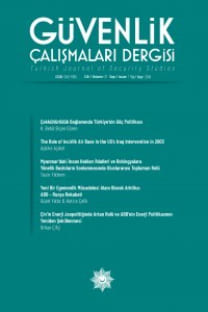Avrupa ve Türkiye Özelinde Temel Polis Eğitiminde ModernYaklaşımlar ve Uygulamalar
Modernleşmenin, sanayileşmenin ve küreselleşmenin hız kazandığı günümüz modern toplumlarında sosyal düzenin istikrarını ve güvenliğini sağlayan polis teşkilatının eğitim süreci, polis eğitiminde klasik yaklaşımların aksine önemli bir evrim ve değişim geçirmiştir. Toplumsal sorunların gün geçtikçe karmaşıklaştığı, polise düşen görevin ve demokratik gelişmeye bağlı olarak toplumun polisten beklentisinin gün geçtikçe arttığı bir çağda klasik polis eğitimi önemini yitirmiştir. Polis eğitiminde reform çağrısı, 1980’lerde toplum destekli polislik ve demokratik polislik modellerindeki yükseliş ve popülerlikle birlikte hayli destek toplamıştır. Böylece, polis eğitim ve öğretiminin, profesyonelliğin geliştirilmesi; polisin hesap verebilirliğinin ve performansının yükseltilmesi; iş motivasyonunun artırılması; bölgesel, ulusal ve uluslararası seviyede çeşitli kurum ve ülkelerle işbirliği içerisinde eğitim konusunda bir konsorsiyum oluşturulması; suç ve suçlu ile mücadelede ileri teknolojik imkanlardan yararlanılması ve vatandaşların keyfi güç kullanımından korunması temelinde silahsız mücadele ve güç kullanma eğitimini de içerecek şekilde yeniden inşa edilmesi ihtiyacı doğmuştur. Buna bağlı olarak da, polisliğe alım sürecinde ve polis eğitim sisteminde Türkiye’de ve Dünya’da önemli değişimler gerçekleşmiştir. Bu çalışmada, Avrupa’da ve Türkiye’de uygulanmakta olan modern polis eğitim sistemi incelenecek olup, polis eğitim-öğretim sistemi ile ilgili değerlendirmelerde bulunulacaktır. Çalışmada Avrupa’daki belli başlı ülke örneklerine ek olarak ABD ve Kanada’daki polis eğitim sistemlerine de kısaca yer verilmiştir
Modern Approaches And Practices in Police Education System Specific to Europe and Turkey
In today’s modern societies in which modernization, industrialization and globalization have accelerated and the education process of police organization, ensuring stability and security of social order, has undergone a significant evolution and change unlike the classical approaches of police education. The importance of classical police education has diminished in the age we live because of the increasing complex social problems and expectations of people from the police day by day thanks to the democratic growh. The reform request in police training has gained considerable support in the 1980s with the rise of popularity of community-supported policing and democratic policing models. Thus, it has been needed to develop police education and training within the context of professionalism;improving the accountability and performance of police officers; establishment of a consortium on education in cooperation with various institutions and countries at regional, national and international level; benefiting from advanced technological opportunities in combating crime and criminals and training on unarmed fighting and use of force on the basis of protection of citizens from arbitrary use of force. As a result, significant changes have occurred in Turkey and the world in the police procurement process and police education system. In this study, the modern police education system which is being applied in Europe and Turkey will be examined and evaluations on police education and training system will be made. In addition to examples of major European countries, the study briefly covers police training systems in the United States and Canada
___
- Bayley, D., (1985), Patterns of Policing, New Brunswick: Rutgers University Press.
- Green, T., Woolston, R., (2016), “Avustralya’da Polis Eğitimi ve Öğretimi ile Polis-Üni- versite İş birliği”, P. Stanislass ve diğerleri, (ed), Defne Orhun, (çev.), Polis Eğitimi ve Öğretiminde Uluslararası Perspektifler, Raoul Wallenberg Institute.
- Emniyet Genel Müdürlüğü, Polis Akademisi Başkanlığı, Dış ilişkiler Şube Müdürlüğü, (2017), Faaliyet Raporu.
- Emniyet Genel Müdürlüğü, Polis Akademisi Başkanlığı, Hizmet İçi Eğitim Şube Müdür- lüğü, (2017), Faaliyet Raporu.
- Loveday, B, (1999), “Government and Accountability of the Police”, R.I Mawby (Ed), Policing Across the World: Issues for the Twenty-first Century, London: UCL Press.
- Mawby, R. I, (1990), Comparative Policing Issues, London: Unwin Hyman Ltd.
- Rydberg, J., (2010), “The Effect of Higher Education on Police Behaviour”, Sage Publi- cations.
- Stanislas,P., (2016). “Polis Eğitimi ve Öğretimi: Çerçeve ve Bağlam”, P. Stanislass ve diğerleri, (ed), Defne Orhun, (çev.), Polis Eğitimi ve Öğretiminde Uluslararası Pers- pektifler, Raoul Wallenberg Institute
- Wyatt S., Bell, N., (2016), “Polis Eğitimi ve Öğretimi Alanındaki Perspektifler: Kanada Deneyimi”, P. Stanislass ve diğerleri, (ed), Defne Orhun, (çev.), Polis Eğitimi ve Öğre- timinde Uluslararası Perspektifler, Raoul Wallenberg Institute.
